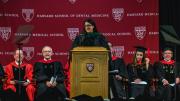Mona Hanna-Attisha, Class Day speaker for Harvard Medical School and the Harvard School of Dental Medicine, is best known as the pediatrician, educator, and public-health advocate whose research exposed lead poisoning in the water of Flint, Michigan, in 2015—and indeed, much of her speech focused on her first-hand experience with the water crisis and the work she did to mitigate it. But Hanna-Attisha also took the time to share with the soon-to-be-doctors and dentists another story, one a century older than her own. She told the crowd about Alice Hamilton, a physician and scientist who pioneered the field of industrial toxicology and became her generation’s leading authority on lead poisoning, paving the way for research like Hanna-Attisha’s own. Hamilton also became the first woman to be appointed to the Harvard faculty in any field.
“Exactly a century ago, in 1919, she came here to Harvard, and she was your very first female professor of the entire University,” Hanna-Attisha said to rousing applause from the audience. “But that appointment came with several sexist stipulations.” Hamilton could not go to football games, or to the Faculty Club, or to Commencement. “So it is so nice to see so many women faculty here. Let’s have them stand and give them a round of applause.” After the crowd’s cheers died down, Hanna-Attisha added, “None of you would be at your Commencement without these guys—girls.”
Throughout her speech, Hanna-Attisha—an associate professor at the Michigan State University College of Public Medicine—emphasized the importance of seeing the world with “fresh eyes” as a doctor, sharing her anguish that she herself could not see the Flint water crisis in its early stages because she was “blinded.”
“Doctors and dentists, each and every single one of you are blessed with a gift,” she said. “Fresh eyes. You only get to see it for the first time once. Don’t miss it. Don’t waste it. In those first moments, you will notice things that will vanish the more times you see it. The shocking turns into the usual. The magical withers into the mundane, the known, the accepted.” She then explained to her audience how refusing to let go of their “fresh eyes” would allow them to chart a new path for medicine, one that would not allow a crisis like Flint to happen again: “Your clarity of vision will show you the world how it should be, not the imperfect place that it is.”
Born in Sheffield, England, to Iraqi scientist and dissident parents, Hanna-Attisha grew up in Royal Oak, Michigan, and conducted and published her research on Flint’s water supply in 2015. In 2014, the city of Flint had switched its water source from the Detroit River to the Flint River in order to cut costs. Hanna-Attisha found that the lead levels in the blood of children doubled after the switch, and that socioeconomically disadvantaged neighborhoods faced the greatest increases in blood lead levels.
Hanna-Attisha told the audience that after she publicized her findings, she was “met with denials and attacks,” called “wrong” and “hysterical,” and even briefly regretted her decision to speak up. “I thought maybe I should’ve just minded my own business,” she said. “After all, I was just one pediatrician going against the most powerful forces in the state. But those thoughts were quickly replaced with the realization that this had nothing to do with me. Every single number in my research was a child, children that as a physician I have literally taken an oath to protect.”
She continued to bring attention to her findings and advocate for government action; she testified before Congress twice; she called for federal assistance for children who were exposed to the lead. The city eventually reverted to its previous water source, and both the state and federal governments funded efforts to alleviate the crisis, in part due to Hanna-Attisha’s activism. She also founded the Michigan State University and Hurley Children’s Hospital Pediatric Public Health Initiative, which seeks to mitigate the effects of the Flint crisis and serve as a national resource for best practices for similarly affected communities.
“As much as the story of Flint is the story of crime committed with absolute indifference to some of the most vulnerable people in our country, it is also the story of all of us, and that is why I am here today. It is about who we are and who we want to be,” Hanna-Attisha said. “It is a story of medicine leaving the comfort zone of our hospitals, our classrooms, our clinics, and entering communities.”
She told the crowd to “pick your injustice—it’s not hard to find these days.” She listed a number of issues that threaten public health: income inequality, inaccessible healthcare, “a full-out assault on women’s bodies and reproductive health,” gun violence, mass incarceration, and the spread of “hate and racism and nationalism.” And she told the future doctors and dentists in the crowd that it is up to them to solve the public-health problems these issues cause.
“One lesson you must take from my story is that your degree grants you stature in your community. The ‘doctor’ in front of my name was a megaphone for the kids of Flint. I used it, and I became the voice of health. And in concert with a growing team, we changed the trajectory of an entire city,” she said. “I urge you, all of you, every single one of you, to be the voice of health. We are depending on you. We have been waiting for all of you.”
The speech text has been posted here.









